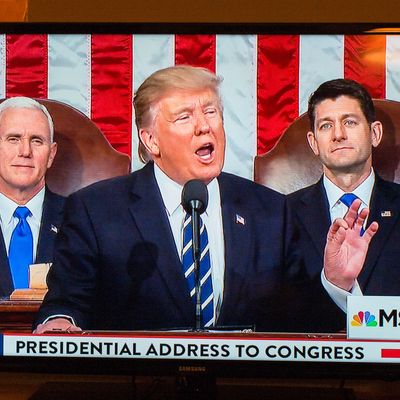
The problem of Donald Trump’s manifest unfitness for office has inspired some writers to propose invoking the 25th Amendment, under which the president can be deemed unable to serve by the vice-president and a majority of the cabinet (plus two-thirds of Congress). But the 25th Amendment solution presents constitutional and political obstacles that could be elided with a more elegant and mutually satisfying alternative: the Truman Show solution.
The Truman Show is a 1998 film about a man named Truman who, unbeknownst to him, has been raised from birth on the set of a reality-television show. The show’s producers keep Truman unaware that the town he lives in is a set, that he is being filmed at all times, or that everybody he encounters is an actor.
Trump could be easily coaxed into a similar ruse. He would live in a fake White House, and “work” among his existing staff. Since most of them are serving out of a desire to prevent him from committing catastrophic blunders, the new arrangement would make their work easier. Indeed, serving as pretend staff to a pretend president would be far less stressful. “President” Trump could be allowed to indulge his reckless impulses without consequence. Trump could fire James Comey or Jeff Sessions, or nuke any country he wants. It would all play out in fake news programs beamed into his television.
In the movie, the ruse foundered when Truman yearned to travel to the world beyond his movie set. Trump would pose little such danger. He hates travel, and reportedly had to be coaxed into his first overseas visit. Trump rarely goes outdoors at all, and when he does he prefers to spend time at his own properties.
Alex Thompson’s revelation that Trump’s staff prepares for him daily binders of exclusively fawning news clips suggests the White House staff has already gone some ways toward this solution. Trump has created a fantasy world, is constantly angered by news depicting a different external reality than the one constructed for him, and must be coaxed to return to the fantasy one to prevent him from lashing out in anger. “One White House official said the only feedback the White House communications shop, which prepares the folder, has ever gotten in all these months is: ‘It needs to be more fucking positive,’” reports Thompson.
The news clips delivered to Trump in his fake White House could be as positive as Trump desires. Even the failing New York Times would be reporting on his rising polls, his string of legislative triumphs, and the cowering of his chastened enemies. If Trump desired to see the results for himself, Marine One could whisk him to a Trump-branded resort, where thankful fans would cheer him on. They could even arrange a tour of several hundred yards of the brand-new, solid-gold, solar-panel-covered border wall. Then he could return to his phone and bask in the Twitter praise generated by bots. (This part may be happening already.)
Trump, like Truman, is a persona shaped by the conventions of reality television. But while Truman yearns to break free from the artifice of television, Trump craves it. He harbors no deep ambitions to change the country in any substantive way. All he wants is to turn on his television and see himself being praised. Reality television created America’s Trump crisis, and reality television can solve it.






























